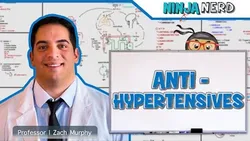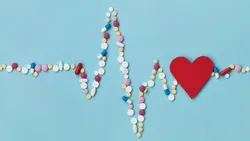
Antihypertensive Drugs 
Antihypertensive drugs are medications used to treat high blood pressure. They include sympatholytics, diuretics, renin-angiotensin-aldosterone inhibitors, vasodilators, and agents for atrial fibrillation. These drugs work to reduce blood pressure and improve overall health. ▼
ADVERTISEMENT
Course Feature
![]() Cost:
Cost:
Free
![]() Provider:
Provider:
Youtube
![]() Certificate:
Certificate:
Paid Certification
![]() Language:
Language:
English
![]() Start Date:
Start Date:
On-Demand
Course Overview
❗The content presented here is sourced directly from Youtube platform. For comprehensive course details, including enrollment information, simply click on the 'Go to class' link on our website.
Updated in [February 21st, 2023]
Lab
Antihypertensive Drugs Introduction
Sympatholytics
Diuretics
Renin-Angiotensin-Aldosterone Inhibitors
Vasodilators
Antihypertensive Agents by Comorbidity Introduction
Antihypertensive Agents for Atrial Fibrillation, Atrial Flutter, SVT
Antihypertensive Agents for Coronary Artery Disease, Angina
Antihypertensive Agents for Post-Myocardial Infarction, CHF
Antihypertensive Agents for Diabetes Mellitus, CKD
Antihypertensive Agents for Benign Prostatic Hyperplasia BPH
Antihypertensive Agents for Osteoporosis
Antihypertensive Agents for Pregnancy
Antihypertensive Agents for COPD, Asthma
Essential Hypertension Choices
Hypertensive Emergency
Hypertensive Emergency Choices
Antihypertensive Drugs Practice Problems
Comment, Like, SUBSCRIBE!
(Please note that we obtained the following content based on information that users may want to know, such as skills, applicable scenarios, future development, etc., combined with AI tools, and have been manually reviewed)
Antihypertensive Drugs is a course designed to help learners understand the different types of drugs used to treat high blood pressure. It covers topics such as sympatholytics, diuretics, renin-angiotensin-aldosterone inhibitors, vasodilators, and antihypertensive agents by comorbidity. It also covers the use of antihypertensive drugs for atrial fibrillation, atrial flutter, SVT, coronary artery disease, angina, post-myocardial infarction, CHF, diabetes mellitus, CKD, benign prostatic hyperplasia, osteoporosis, pregnancy, COPD, asthma, essential hypertension, and hypertensive emergency. Learners can gain a comprehensive understanding of the different types of drugs used to treat high blood pressure, as well as the indications for their use. They can also practice problem-solving skills by completing practice problems related to antihypertensive drugs. This course is ideal for healthcare professionals, such as nurses, pharmacists, and physicians, who need to understand the different types of drugs used to treat high blood pressure.
[Applications]
After this course, students can apply their knowledge of antihypertensive drugs to their practice. They can use the information to help them make informed decisions when prescribing antihypertensive drugs to their patients. They can also use the practice problems to test their understanding of the material and to help them become more confident in their prescribing decisions. Additionally, they can use the information to help them better understand the risks and benefits of different antihypertensive drugs and how they interact with other medications.
[Career Paths]
1. Clinical Pharmacist: Clinical pharmacists specialize in the safe and effective use of medications. They work in hospitals, clinics, and other healthcare settings to ensure that patients receive the right medications at the right doses. They also provide patient education and counseling on the proper use of medications. As the healthcare industry continues to evolve, the demand for clinical pharmacists is expected to increase.
2. Pharmaceutical Researcher: Pharmaceutical researchers are responsible for developing new drugs and treatments. They conduct research on the safety and efficacy of medications, and develop new drugs to treat a variety of conditions. As the healthcare industry continues to grow, the demand for pharmaceutical researchers is expected to increase.
3. Pharmaceutical Sales Representative: Pharmaceutical sales representatives are responsible for promoting and selling medications to healthcare professionals. They must have a thorough understanding of the medications they are selling, and must be able to effectively communicate the benefits of the medications to healthcare professionals. As the healthcare industry continues to grow, the demand for pharmaceutical sales representatives is expected to increase.
4. Pharmacy Technician: Pharmacy technicians are responsible for assisting pharmacists in dispensing medications. They must have a thorough understanding of the medications they are dispensing, and must be able to accurately fill prescriptions. As the healthcare industry continues to grow, the demand for pharmacy technicians is expected to increase.
[Education Paths]
1. Bachelor of Science in Pharmacy: This degree program provides students with a comprehensive understanding of the principles of pharmacology, drug development, and drug delivery. Students learn about the pharmacokinetics and pharmacodynamics of drugs, as well as the clinical applications of drugs. They also gain an understanding of the legal and ethical considerations of drug use. This degree is becoming increasingly popular as the demand for pharmacists continues to grow.
2. Master of Science in Pharmaceutical Sciences: This degree program provides students with a more advanced understanding of the principles of pharmacology, drug development, and drug delivery. Students learn about the pharmacokinetics and pharmacodynamics of drugs, as well as the clinical applications of drugs. They also gain an understanding of the legal and ethical considerations of drug use. This degree is becoming increasingly popular as the demand for pharmacists continues to grow.
3. Doctor of Pharmacy: This degree program provides students with a comprehensive understanding of the principles of pharmacology, drug development, and drug delivery. Students learn about the pharmacokinetics and pharmacodynamics of drugs, as well as the clinical applications of drugs. They also gain an understanding of the legal and ethical considerations of drug use. This degree is becoming increasingly popular as the demand for pharmacists continues to grow.
4. Master of Science in Clinical Pharmacy: This degree program provides students with a comprehensive understanding of the principles of pharmacology, drug development, and drug delivery. Students learn about the pharmacokinetics and pharmacodynamics of drugs, as well as the clinical applications of drugs. They also gain an understanding of the legal and ethical considerations of drug use. This degree is becoming increasingly popular as the demand for pharmacists continues to grow.
Course Provider

Provider Youtube's Stats at AZClass
Discussion and Reviews
0.0 (Based on 0 reviews)
Explore Similar Online Courses

7 Best Ways To Make Money Online From Home

Step by Step Application Deployment on LKE using Helm Kubernetes on Cloud (2&2)

Python for Informatics: Exploring Information

Social Network Analysis

Introduction to Systematic Review and Meta-Analysis

The Analytics Edge

DCO042 - Python For Informatics

Causal Diagrams: Draw Your Assumptions Before Your Conclusions

Whole genome sequencing of bacterial genomes - tools and applications

Birth of a drug

Pharmacology

Pharmacology & Cardiovascular Health
 Related Categories
Related Categories
 Popular Providers
Popular Providers
Quiz
 Submitted Sucessfully
Submitted Sucessfully
1. Which of the following is not a type of antihypertensive drug?
2. Which of the following is a type of antihypertensive drug used for post-myocardial infarction and congestive heart failure?
3. Which of the following is a type of antihypertensive drug used for benign prostatic hyperplasia?
4. Which of the following is a type of antihypertensive drug used for COPD and asthma?


Start your review of Antihypertensive Drugs